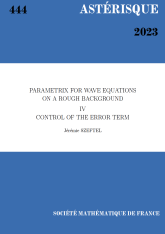- Consulter un extrait
- Année : 1992
- Tome : 207
- Format : Électronique
- Langue de l'ouvrage :
Anglais - Class. Math. : 35P20, 35Q40
- Pages : 7-33
- DOI : 10.24033/ast.146
Je recherche
Actualités et Événements
Aucun événement ne correspond à votre recherche
Pages institutionnelles
Aucune page ne correspond à votre recherche
Dossiers et ressources
Aucun dossier ou ressource ne correspond à votre recherche
Publications
Aucune publication ne correspond à votre recherche

La publication suivante a é ajoutée à votre panier:
Semiclassical spectral asymptotics
Semiclassical spectral asymptotics
- Prix public 0 €
- Prix membre 0 €
Vous n'êtes pas adhérent
Adhérez et profitez dès maintenant d'une réduction de -30% sur cette publication.
Devenir adhérent
Déjà adhérent ? Connectez-vous pour profiter de vos avantages
Vous devez être inscrit pour pouvoir acheter des publications et des abonnements :
Informez-nous de tout problème que vous avez...

